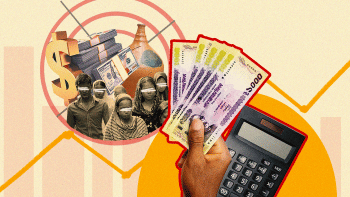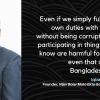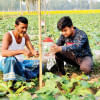Is the budget just another attempt at ‘youthwashing’?

The recently proposed budget has been disappointing for job seekers, especially the youth. People expected allocations favouring jobs and quality education for young people, yet the announced national budget fell short in both aspects.
According to a recent citizen survey entitled "New Government, National Budget and Citizens' Aspirations" conducted by the Centre for Policy Dialogue, three top priorities were decent jobs (22 percent), quality education (17.5 percent) and social protection (12 percent). Among those who prioritised decent jobs, almost half wanted reduced unemployment, while one-third wanted increased job opportunities. This year's budget didn't reflect these priorities.
This is all the more surprising considering that the Awami League's 2024 election manifesto listed "ensuring job-oriented education and employment for youth" as the second most important focus. Moreover, one of this year' election campaign slogans was "The Power of Youth—Prosperity of Bangladesh." A decade ago, the 2014 Election Manifesto of Awami League also made bold claims that, "...illiteracy will fade away, educated and trained human resources will abound, [and] unemployment will be reduced to zero with crores of young people getting employed."
In fact, in the last 15 years, more than a dozen plans, policies, acts and rules have been introduced concerning the youth. The National Youth Policy 2017, National Skills Development Policy 2011, the Seventh Five Year Plan 2016-2020, the Expatriate and Overseas Employment Policy 2016, and the Overseas Employment and Migrants Act 2013—all have acknowledged and addressed the issue of youth employment. The A2i project has promoted the idea of the smart youth of Smart Bangladesh while the Department of Youth Development of the Ministry of Youth and Sports also has published a supplementary report entitled "Smart Youth, Prosperous Country, Bangabandhu's Bangladesh." Since January 2020, we have also adopted a specific plan of action for the implementation of the National Youth Policy 2017.
So why does a pro-youth budget still remain elusive? One explanation might be "youthwashing."
Speech writers and political event organisers are more than happy to make lofty pro-youth promises and encourage youth participation for the sake of good publicity and annual reports. Yet when it comes to delivering on promises, they are missing in action.
Youthwashing is on the rise. Take for instance the 2024 election manifesto of the Awami League. It painstakingly catalogued the government's achievements in youth development—over 13 million young individuals were provided with skill development training and close to a million young people are engaged in self-employment. We are told that, owing to various motivational programmes, training, self-employment projects, youth loan schemes, and poverty alleviation initiatives, there is a sharp decline in the unemployment rate from 6 percent in 2009 to 3.6 percent in 2022.
Yet, the reality is that the majority of our unemployed population is between 15 and 24 years old. Not only does Bangladesh have a double-digit youth unemployment rate of over 10 percent, the rate of people not in education, employment, and training (NEET) is also nearly double the global average of 21.7 percent.
According to Bangladesh Bureau of Statistics data, the share of youth aged 15 to 24 years who fall into the NEET category has increased from 28.9 percent in 2017 to 39.88 percent in 2022. Paradoxically, university degree holders also continue to suffer from a high rate of unemployment. But this is not a new phenomenon. A 2014 comparative study jointly conducted by the British Council and the Economist Intelligence Unit reported that nearly five out of every 10 graduates in Bangladesh were unemployed against approximately three out of 10 in India and Pakistan. Given the high NEET rate, Bangladesh's youth labour force is shrinking.
Therefore, an editorial in this paper from June 9, 2024, rightly concluded that the proposed budget for FY 2024-25 offers no hope or way out for the Bangladeshi youth.
Just like "greenwashing"—a practice by large corporations and governments to market their activities as sustainable or environmentally friendly, when in reality they do harm—youth concerns in our national policy agenda have become increasingly tokenised for narrow political gains. Each year, we're presented with new empty slogans like "The power of youth, the prosperity of Bangladesh" (Tarunner shokti, Bangladesh er shomriddhi).
Various youth forums and groups have also proliferated, and our government has given space to these groups and forums in various national events. On paper, youth concerns are well-recognised in government policy and planning documents. Yet, they are not met with concrete actions, at least in the decisions that matter. Youth inclusion is yet to bring meaningful changes when it comes to employment and skills.
The so-called "youth inclusion" in planning documents on the one hand, and implementation failure of these plans and budgetary exclusion of youth concerns on the other raises serious questions about the true priorities of our lawmakers. Does the youth agenda have any value beyond serving as cheap ingredients for political campaigns?
Or is youthwashing only a symptom? Perhaps the broken interlink between education and employment despite the propaganda of youth power as the driver of prosperous Bangladesh is reflective of a more fundamental gap in policy making, i.e., the lack of credible and accountable political leadership.
That said, youthwashing is not unique to Bangladesh. Similar to exploiting the green agenda for popular publicity and rhetoric, politicians in authoritarian regimes are increasingly exploiting young people's voices but doing so in a performative way while de facto paying little attention to them, or failing to act on concerns raised by this group. But this practice is likely to be particularly costly for Bangladesh given that our first demographic dividend window will close between 2030 and 2042. Youthwashing must be resisted as a strategy for political elites to cover up underinvestment in education and employment.
Globally, the youth has had a long legacy of facilitating social transformation processes through active involvement in democratic uprisings. Future-focused movements such as fighting climate change have also attracted young voices who are collectively campaigning to save the planet and protect their future. Recognising their transformative potential, international development partners are also supporting concrete measures for youth policy development to facilitate young people's access to rights and social opportunities. The UN, too, recognises youth action as key to SDGs such as Quality Education, Decent Work and Economic Growth, and Reduced Inequalities. Given this recognition, young people must collectively bargain for their future and hold governments accountable for delivering jobs and quality education.
Bangladeshi policymakers, therefore, must not underestimate the youth's ability for public action, as evidenced in the nationwide protests demanding fair, quota-free access to public sector jobs in 2018. At a time of gradual democratic backsliding worldwide, the growing practice of using young people as popular propaganda tools must be challenged. Politicians must be held accountable for their election-time promises of reducing youth unemployment. We must not forget that young people are the main stakeholders of the Smart Bangladesh Vision 2041 as well as the Delta Plan 2100. It is time for them to take charge of the public campaign for the formulation of a "national youth budget" as well as a national strategy for youth employment.
M Niaz Asadullah is Southeast Asia Lead of the Global Labor Organization, Fellow of IZA Institute of Labor Economics, Visiting Professor of Economics, University of Reading, UK, and Professorial Fellow, North South University. He can be reached at [email protected]
Views expressed in this article are the author's own.
Follow The Daily Star Opinion on Facebook for the latest opinions, commentaries and analyses by experts and professionals. To contribute your article or letter to The Daily Star Opinion, see our guidelines for submission.

 For all latest news, follow The Daily Star's Google News channel.
For all latest news, follow The Daily Star's Google News channel. 










Comments